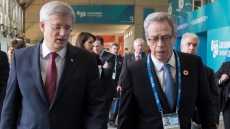TORONTO — A slump in oil prices, low interest rates and a weaker loonie may be hurting Alberta's economy, but Ontario's finance minister says they're giving his province some much-needed "breathing room" as it tackles a $10.9-billion deficit.
The revised deficit figure, announced Tuesday by Finance Minister Charles Sousa, is lower than the previously projected $12.5 billion, but critics and opposition leaders remain skeptical about the Liberal government's ability to balance the books in two years, as promised.
It's estimated that Ontario's economy will grow by 2.7 per cent next year, Sousa said, positioning the province "as an island of economic calm in a turbulent world."
While the drop in oil prices has affected Ontario companies that service refineries, the province is an importer of oil and lower oil prices have meant lower costs for businesses and manufacturers, Sousa said.
"Lower oil prices, lower interest rates and a lower dollar are together giving us some welcome breathing room," Sousa said Tuesday in a speech to the Toronto Region Board of Trade, though he cautioned it may only be temporary.
In Alberta, the budget tabled last week increases taxes and fees across the board and runs the largest deficit in the province's history at $5 billion. Premier Jim Prentice has billed the document as necessary to make up for billions in lost oil revenue and to insulate the province's day-to-day spending from roller-coaster swings in energy prices.
Sousa said the date for Ontario's budget will be announced "in the coming days." Despite the questions raised by various analysts, credit rating agencies and opposition parties about whether the government can eliminate the deficit by 2017-18, Sousa insisted it can be achieved.
The $10.9-billion deficit is a slight uptick from last year's $10.5 billion. That trend is going in the wrong direction, the opposition parties say.
The path to balance is through finding savings in government programs, managing compensation costs and "maintaining" revenue, Sousa said.
The government is reviewing its program spending, which Sousa said is projected to save $1.25 billion over the next three years. It is also in the midst of bargaining with public sector workers, with a target of net zero so that any increases are offset. The annual sunshine list, released last week, showed a 14-per-cent jump in the number of public sector workers making more than $100,000 per year.
The spring budget is expected to reveal government plans for asset sales, but the Liberals have said any money generated will go toward transit and other infrastructure projects.
Sousa has so far not ruled out raising taxes and the Liberals have said they won't cut services and programs to get to balance.
Fitch Ratings downgraded Ontario's long-term debt rating in December, warning of "difficult actions'' that would be needed to eliminate the deficit in just two years. Moody's changed Ontario's debt rating last July to negative from stable, citing similar concerns.
Auditor General Bonnie Lysyk has warned that even if the deficit is eliminated in 2017-18, Ontario's net debt will have soared to $325 billion, more than double the level of a decade ago.
Progressive Conservative finance critic Vic Fedeli said the government has not provided detailed information on how it will get to balance.
"They show a made-up revenue number, they show a made-up expense number, but there's no line by line for either of them and they magically add up to a zero, a balanced budget in 2017-18," Fedeli said.
NDP Leader Andrea Horwath predicted the upcoming budget would contain bad news for taxpayers as the Liberals try to reach balance, and said it was no surprise they had once again managed to "beat" their interim deficit reduction goals.
"This is what government does every time, announce just before a budget that they have done some great things to best their deficit targets," said Horwath.
Ontario has the lowest per capita program spending in Canada, Sousa said. Program spending growth has increased an average of 1.2 per cent per year from 2010-14 and is projected to grow by 0.8 per cent until 2018, he said.





